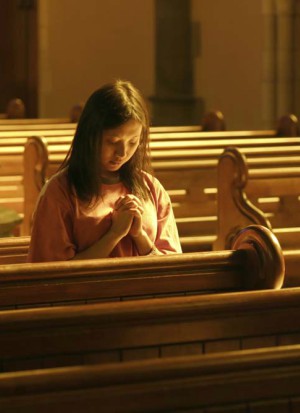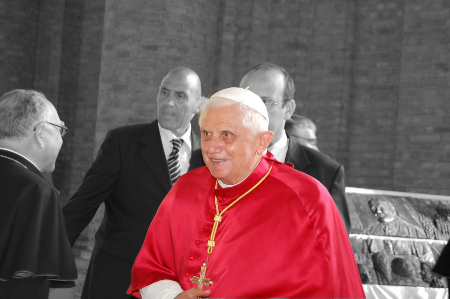Commentary on Psalm 143(144):1-8
FREE Catholic Classes
"Lord, What Is Man That You Care for Him?"
VATICAN CITY, JAN. 14, 2006 (Zenit) - Here is a translation of the address Benedict XVI gave during today's general audience. He dedicated his address to comment on Psalm 143(144):1-8.
* * *
1. Our journey through the Psalter used by the Liturgy of Vespers now brings us to a royal hymn, Psalm 143(144), of which the first part was proclaimed: In fact, the liturgy proposes this hymn dividing it in two sections.
The first part (cf. verses 1 to 8) reveals clearly the literary characteristic of this composition: The psalmist uses quotations from other texts of the Psalms, articulated in a new hymn and prayer.
Given that the psalm belongs to a later period, it is easy to imagine that the king who is exalted no longer has the features of the Davidic sovereign, since Jewish royalty ended with the Babylonian exile in the sixth century B.C., but rather those of the luminous and glorious figure of the Messiah, whose victory is no longer a martial-political event, but an intervention of liberation against evil. The "messiah," Greek word that indicated the "anointed one," is replaced by the "Messiah" par excellence, who in Christian literature has the face of Jesus Christ, "the son of David, the son of Abraham" (Matthew 1:1).
2. The hymn begins with a blessing, that is, with an exclamation of praise addressed to the Lord, celebrated with a little litany of salvific titles: He is the sure and stable rock, he is loving grace, he is the protected fortress, the refuge of defense, liberation, the shield that forestalls every evil assault (cf. Psalm 143[144]:1-2). Also appearing is the martial image of God who trains his faithful in the struggle so that he will be able to face the hostilities of the environment, the dark powers of the world.
Despite his royal dignity, before the Almighty Lord, the psalmist feels weak and fragile. Then he expresses a profession of humility that is formulated, as he already said, with the words of Psalms 8 and 38. He feels like "a breath," like "a passing shadow," inconsistent, submerged in the flux of time that passes, marked by the limitation proper to the creature (cf. Psalm 143[114]:4).
3. The question then arises: Why is God concerned about this very miserable and decrepit creature? To this question (cf. verse 3) the grandiose divine apparition responds, the so-called theophany that is accompanied by a procession of cosmic elements and historical events, oriented to celebrate the transcendence of the supreme King of being, of the universe and of history.
Thus, mention is made of mountains that spew forth smoke with volcanic eruptions (cf. verse 5), of flashes of lightning that seem like arrows flung against evildoers (cf. verse 6), of "many" oceanic "waters," symbol of the chaos from which the king is saved by the power of the same divine hand (cf. verse 7). In the background are the foreign foes who "speak untruth" and whose "[right hands are raised in lying oaths]" (cf. verses 7-8), a concrete representation, according to the Semitic style, of idolatry, moral perversion, of the evil that is truly opposed to God and to his faithful.
4. In our meditation, we now pause for a moment on the profession of humility expressed by the psalmist and we will make use of Origen's words, whose commentary on our text has come to us through St. Jerome's Latin version. "The psalmist speaks of the fragility of the body and of the human condition," as in virtue of the human condition, man is nothing. "Vanity of vanities; all is vanity," says Ecclesiastes. The question again arises of wonder and thanksgiving: "'Lord, what is man that you care for him? ... It is a great happiness for man to know his own Creator. In this we are distinguished from beasts and other animals, as we know we have a Creator, while they do not know it."
It is worthwhile to meditate for a moment on these words of Origen, who sees the fundamental difference between man and the rest of animals in the fact that man is able to know God, his Creator, in the fact that man is capable of truth, of a knowledge that becomes a relationship, a friendship. In our time, it is important that we not forget God, along with the other knowledge that we have acquired in the meantime, which is so much! Such knowledge becomes problematic -- what is more, dangerous -- if the fundamental knowledge is lacking that gives meaning and orientation to everything, if knowledge of God the Creator is lacking.
Let us return to Origen. He says: "You will not be able to save this misery, which is man, if you yourself do not carry him on your shoulders. 'Bow thy heavens, O Lord, and come down.' Your abandoned sheep will not be able to cure itself if you do not carry it on your shoulders. ... These words are addressed to the Son: 'Bow thy heavens, O Lord, and come down.' ... You have come down, you have bowed the heavens and you have stretched out your hand from on high, and you have deigned to carry the flesh of man on your shoulders, and many believed in you" (Origen-Jerome, "74 Omelie sul Libro dei Salmi," Milan, 1993, pp. 512-515).
For us Christians, God is no longer, as in the philosophy prior to Christianity, a theory but a reality, as God has "bowed the heavens and come down." He himself is heaven, and has come down among us. With reason, Origen sees in the parable of the lost sheep, which the shepherd carries on his shoulders, the parable of the Incarnation of God. If, in the Incarnation, he has come down and has carried our flesh on his shoulders, he has carried us on his shoulders. In this way, the knowledge of God has become a reality, it has become friendship, communion. We give thanks to the Lord, as "he has bowed his heaven and come down," has carried our flesh on his shoulders and leads us on the paths of our life.
The psalm, which begins with the discovery that we are weak and removed from the divine splendor, at the end comes to this great surprise of the divine action: With us is the God-Emmanuel, which for Christianity has the loving face of Jesus Christ, God made man, made one of us.
[At the end of the audience, the Pope greeted pilgrims in several languages. In English, he said:]
Dear Brothers and Sisters,
Today's catechesis centers on Psalm 143, which takes the form of a King's prayer for victory and peace. It opens with praises to God, expressed through a litany of salvific titles recalling the Lord as a fortress, a shield and a place of refuge.
Notwithstanding his royal dignity, the King feels his weaknesses and fragility, and recognizes his life as one that "fades like a shadow." In humility he ponders: Lord, what is man that you care for him? His questioning evokes a plethora of images of divine interventions, while illustrating how the transcendence of the supreme King of the Universe saves mankind from idolatry, moral perversion and evil.
Reflecting on this psalm, Origen draws to our attention the great happiness we gain through knowing our Creator. Indeed, it is this knowledge which distinguishes us from other creatures. God -- Emmanuel is with us! Let us rejoice in our privilege to recognize the Lord and to encounter his loving face!
I extend a warm welcome to the English-speaking pilgrims and visitors here today, including groups from Finland, Japan and the United States of America. Upon you and your loved ones at home, I invoke the joy and peace of Christ our Lord!
I wish to offer my heartfelt greetings to the students and teachers of the Ecumenical Institute of Bossey in Switzerland. I hope that your visit to the tombs of the Apostles Peter and Paul, together with your meetings, will be a stimulus to strengthen your commitment to the vital task of promotion of unity among Christians.
Contact
The Vatican
https://www.catholic.org
, VA
Pope Benedict XVI - Bishop of Rome, 661 869-1000
info@yourcatholicvoice.org
Keywords
Psalm, Commentary, Faithful, Benedict, Liturgy
More Catholic PRWire
Showing 1 - 50 of 4,716
A Recession Antidote
Randy Hain
Monaco & The Vatican: Monaco's Grace Kelly Exhibit to Rome--A Review of Monegasque-Holy See Diplomatic History
Dna. Maria St. Catherine Sharpe, t.o.s.m., T.O.SS.T.
The Why of Jesus' Death: A Pauline Perspective
Jerom Paul
A Royal Betrayal: Catholic Monaco Liberalizes Abortion
Dna. Maria St.Catherine De Grace Sharpe, t.o.s.m., T.O.SS.T.
Embrace every moment as sacred time
Mary Regina Morrell
My Dad
JoMarie Grinkiewicz
Letting go is simple wisdom with divine potential
Mary Regina Morrell
Father Lombardi's Address on Catholic Media
Catholic Online
Pope's Words to Pontifical Latin American College
Catholic Online
Prelate: Genetics Needs a Conscience
Catholic Online
State Aid for Catholic Schools: Help or Hindrance?
Catholic Online
Scorsese Planning Movie on Japanese Martyrs
Catholic Online
2 Nuns Kidnapped in Kenya Set Free
Catholic Online
Holy See-Israel Negotiation Moves Forward
Catholic Online
Franchising to Evangelize
Catholic Online
Catholics Decry Anti-Christianity in Israel
Catholic Online
Pope and Gordon Brown Meet About Development Aid
Catholic Online
Pontiff Backs Latin America's Continental Mission
Catholic Online
Cardinal Warns Against Anti-Catholic Education
Catholic Online
Full Circle
Robert Gieb
Three words to a deeper faith
Paul Sposite
Relections for Lent 2009
chris anthony
Wisdom lies beyond the surface of life
Mary Regina Morrell
World Food Program Director on Lent
Catholic Online
Moral Clarity
DAN SHEA
Pope's Lenten Message for 2009
Catholic Online
A Prayer for Monaco: Remembering the Faith Legacy of Prince Rainier III & Princess Grace and Contemplating the Moral Challenges of Prince Albert II
Dna. Maria St. Catherine Sharpe
Keeping a Lid on Permissiveness
Sally Connolly
Glimpse of Me
Sarah Reinhard
The 3 stages of life
Michele Szekely
Sex and the Married Woman
Cheryl Dickow
A Catholic Woman Returns to the Church
Cheryl Dickow
Modernity & Morality
Dan Shea
Just a Minute
Sarah Reinhard
Catholic identity ... triumphant reemergence!
Hugh McNichol
Edging God Out
Paul Sposite
Burying a St. Joseph Statue
Cheryl Dickow
George Bush Speaks on Papal Visit
Catholic Online
Sometimes moving forward means moving the canoe
Mary Regina Morrell
Action Changes Things: Teaching our Kids about Community Service
Lisa Hendey
We ask you, humbly: don't scroll away.
Hi readers, it seems you use Catholic Online a lot; that's great! It's a little awkward to ask, but we need your help. If you have already donated, we sincerely thank you. We're not salespeople, but we depend on donations averaging $14.76 and fewer than 1% of readers give. If you donate just $5.00, the price of your coffee, Catholic Online School could keep thriving. Thank you.Help Now >
Easter... A Way of Life
Paul Spoisite
Papal initiative...peace and harmony!
Hugh McNichol
Proclaim the mysteries of the Resurrection!
Hugh McNichol
Jerusalem Patriarch's Easter Message
Catholic Online
Good Friday Sermon of Father Cantalamessa
Catholic Online
Papal Address at the End of the Way of the Cross
Catholic Online
Cardinal Zen's Meditations for Via Crucis
Catholic Online
Interview With Vatican Aide on Jewish-Catholic Relations
Catholic Online
Pope Benedict XVI On the Easter Triduum
Catholic Online
Holy Saturday...anticipation!
Hugh McNichol












 Daily Readings for Thursday, April 18, 2024
Daily Readings for Thursday, April 18, 2024 St. Apollonius the Apologist: Saint of the Day for Thursday, April 18, 2024
St. Apollonius the Apologist: Saint of the Day for Thursday, April 18, 2024 Aspiration: Prayer of the Day for Thursday, April 18, 2024
Aspiration: Prayer of the Day for Thursday, April 18, 2024
